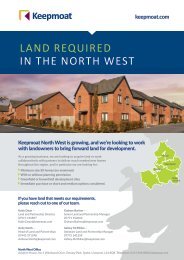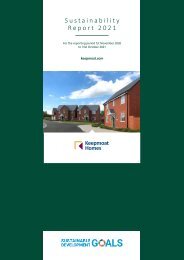Consumer-Code-Book-v4-Feb2023
You also want an ePaper? Increase the reach of your titles
YUMPU automatically turns print PDFs into web optimized ePapers that Google loves.
If a developer charges a fee, they must refund this in full if the customer tells them, within 24<br />
hours of being told the plot is being released for sale (or within a longer period that the<br />
developer tells the customer before they pay the fee), that they do not want to go ahead with<br />
the purchase. If the customer tells the developer they do not want to go ahead with the<br />
purchase after this time, the developer may deduct administration costs from the refund they<br />
pay, as long as they explained this to the customer when they paid the fee.<br />
If there is any difference between the rights and expectations customers have regarding early<br />
bird arrangements and the information given in this code, this code will take priority.<br />
2.2 Reservation agreements<br />
If a customer wants to reserve a new home, they must enter into a formal reservation<br />
agreement with the developer.<br />
The customer and the developer should not enter into a reservation agreement until they both<br />
have all the relevant facts about the purchase and sale.<br />
The developer must make sure that the terms of the reservation agreement are clear, fair and<br />
written in plain language, and that they keep to all relevant legislation.<br />
The developer and the customer must sign the reservation agreement (digitally or in person),<br />
and the developer must give the customer a copy.<br />
The terms of the reservation agreement must include the following details.<br />
a) Who the customer is buying their new home from.<br />
b) The amount of the reservation fee.<br />
c) The customer’s right to cancel within the reservation period.<br />
d) The terms under which the reservation fee can be refunded, and any administration fees or<br />
similar costs that the developer may deduct from the refund.<br />
e) That there is a 14-day cooling-off period, during which the customer can cancel the<br />
agreement and receive a refund of the full reservation fee.<br />
f) How the customer can cancel the reservation agreement, including as a result of a major<br />
change (as set out in part 2.9).<br />
g) That the sale is ‘subject to contract’ (England and Wales only). This means that although the<br />
sale has been agreed, it is not legally binding until the contract has been signed.<br />
h) Details of the new home, including the type of property, plot number, development name,<br />
postal address (if available) and parking arrangements.<br />
i) The purchase price of the new home.<br />
j) How long the price and the reservation agreement are valid for.<br />
k) How and when the reservation agreement will end.<br />
l) Contact details for the provider of any warranty for the new home, together with a summary<br />
document of the warranty cover provided.<br />
m) The date by which exchange of contracts (conclusion of missives in Scotland) must take<br />
place. This date should be reasonable in the circumstances of the transaction, taking<br />
account of when all the information listed in part 2.6 is provided, and in any case should not<br />
be less than six weeks after the reservation date unless the customer asks for an earlier date.<br />
n) Any matters that the sale depends on, for example details of the part exchange (if this applies).<br />
o) Details of how the customer can include in the contract of sale any spoken statement that is<br />
to be relied on.<br />
p) The estimated yearly cost of any management services (factoring costs in Scotland),<br />
together with other costs the customer will have to pay.<br />
q) The tenure of the new home (for example, leasehold, freehold, commonhold and so on) and<br />
all costs associated with this, including how these costs may change in the future.<br />
r) Any event fees that might apply and how these will be assessed.<br />
s) The process for asking for changes to the new home, and the type of changes the customer<br />
can ask for (for example, paint colour, design changes, specification changes).<br />
The developer must also provide an affordability schedule for any expected costs. This is a list<br />
of any costs that are likely to be directly associated with the tenure and management of the<br />
new home over the 10 years following the sale, and which the developer can reasonably be<br />
expected to be aware of.<br />
The affordability schedule must include the following details.<br />
a) Details of any ground rent, including the amount, the payment dates and the formula used<br />
to calculate it.<br />
b) Estimated amounts of any additional costs that the developer knows or expects will arise<br />
directly from the sale. This includes management fees (for example, to maintain the<br />
landscaping, highways that the local authority is not responsible for, and so on), event fees<br />
and other charges. This information should bring to the customer’s attention any service<br />
charges that may increase or be charged in the future as more facilities become available or<br />
sinking fund charges that may be introduced for repairs or maintenance. If the developer<br />
does not know the actual value of costs or charges, they should give the customer a<br />
schedule of costs without including the values.<br />
c) Details of known or expected costs or charges for regular maintenance of built-in<br />
equipment at the development, such as the shared heating system, equipment which<br />
collects grey water (water from sinks, baths, showers and washing machines), air-source heat<br />
pumps and so on, if these are not already included in the management fees or event fees<br />
(for example, following a change of circumstances). If the developer does not know the<br />
actual value of costs or charges, they should give the customer a schedule of costs without<br />
including the values.<br />
d) Estimated costs for maintaining the property (for example, painting render and so on) and<br />
repairing or replacing any fixtures or appliances as necessary during the first 10 years.<br />
2.3 Cooling-off period<br />
All reservation agreements must include a cooling-off period of at least 14 days. If the customer<br />
wants to cancel the reservation, for any reason, during the cooling-off period, the developer<br />
must refund the full reservation fee.<br />
2.4 If the customer cancels the reservation after the cooling-off period<br />
The reservation agreement may set out deductions that will be taken from the refund the<br />
customer will receive if they cancel the reservation after the cooling-off period.<br />
The developer must refund the reservation fee, less any deductions set out in the reservation<br />
agreement, within 14 days of the date of the customer’s notice of cancellation (see section 2.2f).<br />
Part 2: Legal documents, information, inspection and completion<br />
Part 2: Legal documents, information, inspection and completion<br />
14 15<br />
<strong>Consumer</strong> <strong>Code</strong> <strong>Book</strong> Print <strong>v4</strong>.indd 14-15 24/02/2023 10:16










